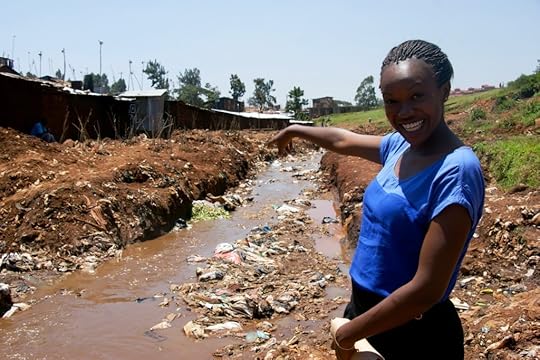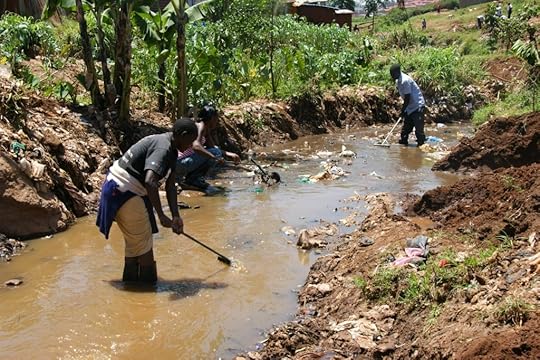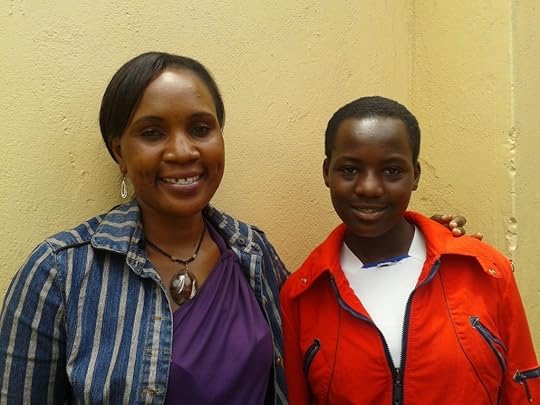Rye Barcott's Blog, page 18
June 20, 2014
A Day Spent Cleaning Up Kibera
By: Charlie Sessoms, UNC School of Nursing Volunteer
—
Daniel Mjee (Economic and Entrepreneurship Department Field Officer) tossed me a football jersey when I arrived Saturday morning, June 7, for the Taka ni Pato community trash clean-up event. And with that, I already felt like an important member of their team. Kiberans young and old who I had not met before greeted me with energetic smiles as we left the Carolina for Kibera main office with karatasi (trash bags), rakes, and shovels. Dressed prepared to navigate the muddy streets in my old military boots, and alongside my new fellow volunteer friends from UNC, I was ready for my first lesson in Kiberan participatory development.
There were about 30 of us. I didn’t know where I was going, so I just followed their lead. Some were raking, while others were holding open trash bags for those who were shoveling trash into them. I found I could work fastest just picking up piles of trash with my hands—with broken glass and metal scrap everywhere, it probably wasn’t the brightest idea, even while wearing gloves. Nonetheless, my adrenaline let me ignore this risk.![DSC_0306 [re-size]](https://i.gr-assets.com/images/S/compressed.photo.goodreads.com/hostedimages/1403347452i/10081835._SX540_.jpg)
Other Kiberans were going about their daily business. Some of them were annoyed that we were blocking their path, and others enjoyed taunting us with remarks that our effort was futile. Immediately I thought, “What are we doing?” The ground here is made of garbage. The idea of cleaning it up seemed to me akin to a child’s effort to dig a tunnel to the other side of the globe. We were not going to scratch the surface of Kibera’s garbage disposal issue in one day’s work. “So what is the point?” I thought.
Just as quickly, I was reassured when I looked around and saw, among others, women in their forties, men in their 20s, and teenagers all wearing the same jerseys and all doing the same work. These people have homes and children to tend to, school to study for, and other work to do that could bring more money than collecting trash, and I knew they could not afford to waste their time doing this filthy chore if they did not believe in its purpose. They were willing to work together to help their community, and by their side, I never felt happier to be covered head-to-toe in mud and who-knows-what (though we all know what) kind of waste.
After picking up trash from the street and stuffing it into trash bags, everyone began taking the bags to what was called a “consolidation point.” From there, it would be easier to load the bags into a truck and drive them out of Kibera. Nelson, a Taka ni Pato volunteer, and I ran back and forth with a piece of canvas to retrieve some bags of trash that had been overfilled and split open. I was out of breath and happy, as if finishing a race, when two Kiberan men asked me, “Do you know what Taka ni Pato means?”
I said, “Yeah, it means Trash is Cash.”
They replied, “No, it means Garbage is Wealth.” However it is translated, Taka ni Pato, is one of many ways Kiberans set an example of community allegiance.
From left: Daniel Mjee, Economic and Entrepreneurship Department field officer; Nelson, Trash Is Cash Volunteer; Charlie Sessoms, UNC School of Nursing Volunteer
—
June 12, 2014
Susan Mueni Is Going to Brazil for the World Cup!
![Mueni 3 [re-size]](https://i.gr-assets.com/images/S/compressed.photo.goodreads.com/hostedimages/1402653540i/9967169._SY540_.jpg) After weeks of filling out forms, scheduling appointments, and waiting, it’s official—Susan Mueni has her visa to travel to Rio de Janeiro, Brazil during the World Cup! She will join hundreds of other young athletes from around the world to participate in a youth forum about sports and social change. The forum is organized by streetfootballworld, a non-profit (and CFK partner since 2010) that seeks to bring together organizations that use sports as a tool for positive change in communities.
After weeks of filling out forms, scheduling appointments, and waiting, it’s official—Susan Mueni has her visa to travel to Rio de Janeiro, Brazil during the World Cup! She will join hundreds of other young athletes from around the world to participate in a youth forum about sports and social change. The forum is organized by streetfootballworld, a non-profit (and CFK partner since 2010) that seeks to bring together organizations that use sports as a tool for positive change in communities.
Mueni is a long-time member of CFK’s Sports Association and Daughters United program. When Mueni learned that her application to attend the youth forum was selected, she said it was “the best news ever this year.” In addition to discussing issues affecting young people in Kenya and the rest of Africa at the forum, she hopes to see legendary athletes — especially Brazil’s national team — play in soccer’s most prestigious tournament. When she comes back, she wants to share her experience with others, especially her family, friends, and “second sisters” who play in CFK’s Sports Association.
June 2, 2014
Book Delivery in Kibera!
In our last print newsletter, we shared a story about a partnership between Carolina for Kibera, Books For Africa, and Julia Cross to bring 2,000 books to CFK. Julia, the eldest daughter of the late Dr. Alan Cross, generously raised over $1,000 to get the books to Kibera, half of which were medical textbooks and reference guides to begin the “Dr. Cross Memorial Medical Library.” You can read the full story in an online version of the newsletter here.
Now, in the video above, you can watch the books’ journey from St. Paul, Minnesota (where Books For Africa is located) to the Kibera community! The video was filmed and produced by Matt Erickson, to whom we owe thanks, along with everyone at Books For Africa and the Cross family for their continued friendship and partnership.
May 30, 2014
Why Girls Play Soccer
For girls in Kibera, choosing to play soccer is not an easy decision. Whereas it is normal for boys to be athletic and active, girls find it difficult to convince their families that sports are just as important for them. Overcoming the stigma that girls can’t or shouldn’t play sports takes a lot of willpower and courage. With the odds stacked so high against playing soccer, why do they do it?
Because soccer is more than a pastime. In soccer, girls can find refuge and family. It helps to build confidence and a sense of accomplishment. Most of all, it provides a way to take a break from the hardships of daily life. If you ask any one of the girls in Carolina for Kibera’s Sports Association why they play soccer, it becomes clear very quickly that life without it would be even more difficult.
At Carolina for Kibera, we believe that sports are tremendously important for girls across the globe, and we wanted to capture that importance in pictures. This photo project came about as part of CFK’s annual Kick for Kibera Soccer Clinic, held in Chapel Hill on UNC’s campus. Every year in the spring, girls of all ages sign up for the clinic, which is run in coordination with the 22-time NCAA Championship Winning UNC Women’s Soccer Team. The clinic gives girls the chance to work one-on-one with nationally-recognized soccer stars. It also connects them with CFK’s Sports Association, in that all of the proceeds benefit the annual CFK Girls’ Soccer Tournament. This year, we asked participants in the clinic along with the UNC Women’s Soccer Team why they play, in order to make the connection between CFK’s U.S. community and the Kibera community even stronger.
These athletes’ answers illuminate why being able to play soccer in Kibera — and all over the world — is important for so many girls. It’s not just a game. Soccer is a passion, a community, and access to a more fulfilled life. And when girls have access to the things and activities they care about, they pioneer positive change in their community.
—
We’d like to extend a big thank you to the UNC Women’s Soccer Team, the girls who participated in this year’s Kick for Kibera clinic and their families, and the women in CFK’s Sports Association who helped make this possible. Head over to our Facebook page to see more photos from this photo project!
May 29, 2014
Preventing Polio from Spreading to Kibera
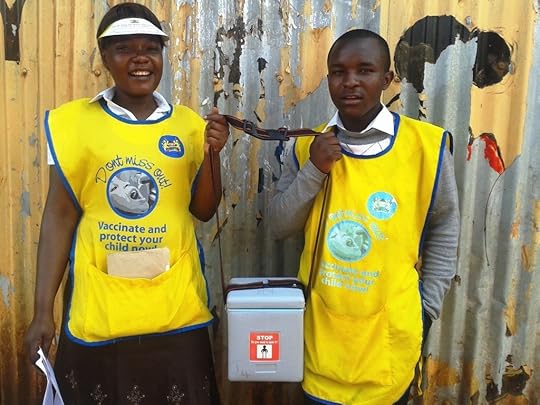
CHWs in Kibera carrying a polio vaccination kit.
Health organizations worldwide treat even a single case of polio very seriously. According to the Global Polio Eradication Initiative, “Most people infected with the polio virus have no signs of illness and are never aware they have been infected. For this reason, the WHO considers a single confirmed case of polio paralysis to be evidence of an epidemic – particularly in countries where very few cases occur.”
In 2013, 14 cases of polio were reported from refugee camps in the town of Dadaab, located in Northeastern Kenya. This was Kenya’s first occurrence of the disease since 2011. In response to the reported cases, the government of Kenya, supported by UNICEF and the WHO, began a polio immunization campaign in areas where the risk of polio is highest, such as in the refugee camps and near Kenya’s borders.
Nairobi was also identified as a risk area, due to its population and transient nature. Social mobilization campaigns were organized within communities to draw awareness to the risk of polio, the importance of immunizations, and places and times where immunizations were available.
Community Health Workers (CHWs), organized through Carolina for Kibera’s Community Wellness program, were also rallied into the campaign. The government set the target of reaching 95% of children under the age of five, the most vulnerable population for communicable diseases, in three villages where CFK’s health programs operate. CHWs got to work, going door-to-door talking to their neighbors about getting their children immunized against polio.
Recently, a report of the polio immunization campaign was released that indicated the targeted number of children under the age of five to be reached (11,123) in the villages where CFK works was met—and surpassed by 32%. This means that a total of 14,651 children were immunized against polio and that CHWs managed to reach beyond the target to new families who had moved into the area or those who were passing through the three villages.
Misinformation about polio, as with misinformation about other diseases in Kibera, is widespread and difficult to correct. This polio vaccination campaign illustrates how members of the community can effectively rally around a cause and support one another. The high immunization rate also shows the level of organization and trust that is present in places where CFK’s Community Wellness Program operates. With this level of confidence in CFK’s health initiatives, stopping the spread of diseases can be more effective, far-reaching, and timely, so that no child in Kibera has to suffer a preventable disease.
May 21, 2014
Your Health Is In Your Hands
By: Yunus Mohammed, CFK Community Outreach Project Officer
–
Many people believe it’s impossible to keep living spaces clean, especially in Kibera, where household walls are often made of iron sheet or cardboard, and floors are often made of mud. It doesn’t help that the environment is also marked by heaps of garbage, which act as breeding sites for insects and rats that are commonly known to carry diseases.
Our own hands are another leading disease transmitter. When they’re not kept clean, they can turn into dangerous weapons against our own lives, especially the lives of our young ones. Keeping our hands clean is regarded as one of the most cost-effective interventions to improve community health. Unfortunately, most households within Kibera have very limited water for proper hygiene or don’t use soap usage when it comes to hand washing.
It’s for these reasons that the Community Wellness Program under CFK’s Health Department launched a campaign dubbed, “Your Health Is In Your Hands!” (“Afya Yako Ipo Mikononi Mwako” is the Swahili version.) The program works closely with 150 Community Health Workers (CHWs), who perform a wide range of tasks for community members, including first aid treatment, health education, nutritional advice, and other services. The program’s main aim is to contribute to the reduction of diarrheal disease in women who are pregnant and children under the age of 5 years in three of Kibera’s villages (Gatwekera, Soweto West, and Kianda). Sponsored by Ronald McDonald House Charities, the hand washing campaign’s focus is to educate the community on the importance of washing hands with soap, install hand washing facilities at the household level, and disseminate hand washing materials to households that need them.
![Step by Step [web size]](https://i.gr-assets.com/images/S/compressed.photo.goodreads.com/hostedimages/1400736667i/9714659._SY540_.jpg)
A step-by-step guide to washing hands, designed by CFK as part of the “Your Health Is In Your Hands!” campaign.
In one of our visits to Kibera’s Soweto West village, the CHWs educated the community on how to wash their hands properly to ensure the community—especially caretakers—understood the proper procedures. During the activity, we discovered that three quarters of the caretakers didn’t know how to wash their hands properly and this begged the question, “Do you really know how to wash your hands properly or are you amongst the three quarters who wash their hands just for the sake of doing it?”
“Washing hands with soap is not new but knowing the correct way of using soap and cleaning hands is a great experience,” said Teddy, a Community Health Worker, who was joined by a number of children, including their caretakers, to show the right way of going about it. “Proper hand washing requires soap and only a small amount of water,” added Maryanne, another CHW. “One should cover wet hands with soap, scrub all the surfaces and rinse well with running water. The hand parts, including palms, back of hands, and especially the area under fingernails must be thoroughly cleaned.”
Ruth, a caretaker within Soweto West village, said, “Till now, I was only washing my hands with soap after using the toilet, but now I have realized that hands should be washed properly before handling food, after changing baby diapers, before and after attending to a sick person, before cooking and eating. Unfortunately, most of us do not use soap regularly at home and this encourages diseases that take a heavy toll on life and money,” she added.
Through the Community Health Workers, the importance of hand washing is becoming well-known throughout Kibera. The simple action of washing hands with soap can break off the transmission of germs that cause diarrhea and pneumonia, the two biggest killers of children under five. Let your hands be clean to save lives.
May 5, 2014
Keeping the River Clean
By: Suzanne Thomson
–
No matter where you go in Kibera, you are guaranteed to see lots of trash. Trash piles high alongside the road, clogs roadside ditches, and gets tossed in the street. It also flows into the Nairobi River, which runs through the urban valley of Kibera. Community members of Kibera not only see trash as an environmental issue but also as an economic resource—and many groups are using trash to make money.
That’s how CFK’s Trash Is Cash (Taka ni Pato) program got started. As part of the program’s activities, many youth groups with innovative ideas about how to clean up their community receive training and mentorship to make their missions more effective. One such group, named the Young Challengers Self Help Group, decided to tackle the river.
When the group first formed, they focused on planting trees, but quickly discovered they needed to become financially sustainable. After learning new techniques through training programs, the group began collecting garbage to earn money for tree saplings and seeds. Two years later, when the Nairobi River Rehabilitation Project announced a clean-up for Kibera’s part of the Nairobi River, the group bid on it and won the paid contract! Working with 35 Kiberans, 15 women and 20 men, the group is now helping themselves earn a living by collecting garbage from the river while also providing a public service.
I had been invited by CFK’s Economic and Entrepreneurship Department (EED) to meet members of the group to see the work they had been doing. We hopped our way down the narrow alleys of Kibera to where the dense, makeshift buildings finally stop and meet the riverbed. When I arrived, Collins, the group’s chairman, was standing next to the river watching his colleagues in the water raking up trash for proper disposal. He pointed to the work being done and explained that they would be planting hundreds of trees after clearing trash from the riverbanks.
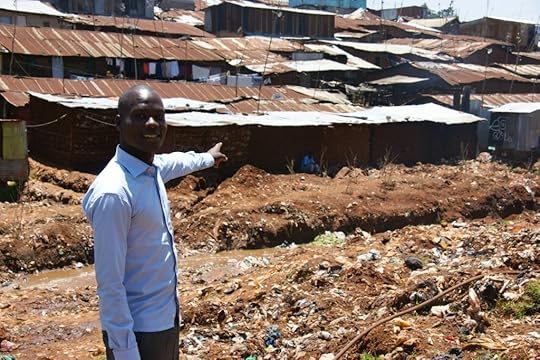
A member of Young Challengers pointing to where the group has planted many rows of trees.

The Young Challengers work to raise water lines above the river in order to avoid contamination.
When I asked the team how they will ensure that the trees will live and that the river will stay clean, it was obvious that I had asked a tricky question. Eventually, one of the members of the group responded, “We have guys who are hired to guard the trees, but the hope is that once they get large enough they’ll be okay and people won’t move onto the land. If there’s something already on the land, people won’t build there.” It was a hopeful statement that will take a lot of community education and support to make viable.
Ultimately, the responsibility of keeping the river clean can’t fall to one group of people. Rather, it will depend on the entire community of Kibera. Work organized by groups like the Young Challengers, along with environmental education and community clean-ups organized by CFK, inspire others to also push for a cleaner Kibera. By helping to lead the change, more groups will follow suit and participate in the change as well. It’s a constant process, but one group making the first strides encourages others to follow in their footsteps.

A message of peace along the riverbank.
April 28, 2014
Jump Rope Is Now an Official Sport in Kenya!
After several months of work and waiting, the Jump Rope Association of Kenya has been registered with the Kenyan government! This brings CFK’s Sports Association one step closer to achieving many of their long-term goals, including creating a national network of jump rope teams.
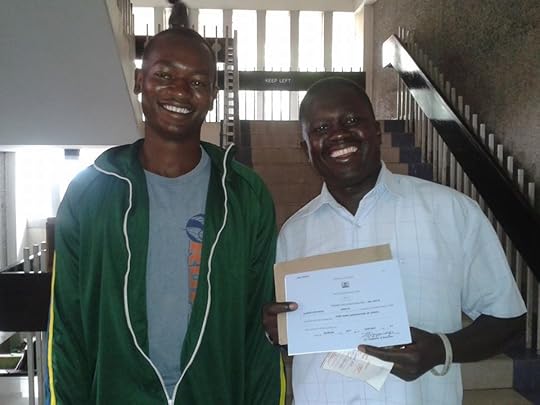 With the association now official, CFK is thinking through the next steps of building the network and developing jump rope as an income generating activity for youth. Since 2010, the CFK Sprinters [the name of the CFK jump rope team] have developed quite a following. They perform everywhere—from stadiums to street corners—and have been requested for many events due to the enthusiasm audiences have for the jumpers’ talent. The association will support teams like the Sprinters as they expand to new audiences while also making money to support education and jump rope programs across the country.
With the association now official, CFK is thinking through the next steps of building the network and developing jump rope as an income generating activity for youth. Since 2010, the CFK Sprinters [the name of the CFK jump rope team] have developed quite a following. They perform everywhere—from stadiums to street corners—and have been requested for many events due to the enthusiasm audiences have for the jumpers’ talent. The association will support teams like the Sprinters as they expand to new audiences while also making money to support education and jump rope programs across the country.
As a registered organization with the Kenyan government, it will also be easier to start new chapters in Kibera as well as outside Kibera. Their new official status brings them one step closer towards making jump rope the next big sport for all of Kenya!
The CFK Sprinters Are Now Official!
Congratulations to the CFK Sprinters! After several months of work and waiting, CFK’s jump rope team, the CFK Sprinters, is now registered with the Kenyan government as an official association. This brings the team one step closer to achieving many of their long-term goals, including creating a national network of jump rope teams!
 Since the program’s launch in 2010, the CFK Sprinters have developed quite a following. They perform everywhere—from stadiums to street corners—and have been requested for many events due to the enthusiasm audiences have for the jumpers’ talent. The team is exploring ways for the program to generate income that will go towards making the team bigger and better while also supporting athletes’ education.
Since the program’s launch in 2010, the CFK Sprinters have developed quite a following. They perform everywhere—from stadiums to street corners—and have been requested for many events due to the enthusiasm audiences have for the jumpers’ talent. The team is exploring ways for the program to generate income that will go towards making the team bigger and better while also supporting athletes’ education.
As a registered organization with the Kenyan government, it will also be easier to start new chapters in Kibera as well as outside Kibera. Their new official status brings them one step closer towards making jump rope the next big sport for all of Kenya!
April 25, 2014
Working for Her Children’s Future
By: Suzanne Thomson, CFK Organizational Consultant
–
At a recent meeting for the parents of CFK scholarship recipients, Mildred sat in the front row, attentively listening to the discussion taking place and turning in her chair when parents behind her stood to talk. Like the other parents at the meeting, her child is a beneficiary of a CFK secondary school scholarship, which covers 100% of students’ school fees. Knowing how important this is for her daughter, Gloria—and for her family in general—Mildred joined the conversation with the other parents to figure out how they can best support CFK’s Education Program and their children.
Born and raised in Kibera, Mildred didn’t “get the privilege to get through school,” having to drop out in the second year of secondary school because her family wasn’t able to afford the fees. “My mom didn’t know about education and didn’t value it, so it wasn’t a priority. Now, we have to value education to get ahead because everyone asks for papers [certificates proving you’ve completed educational courses]; you have to have them if you want to be considered for a job.”
Living in the Soweto East village of Kibera with her husband and three children (Gloria being the eldest at 14), Mildred and her family were selected to be part of a governmental initiative to “upgrade the slums” by constructing permanent residential buildings for Kiberans. As part of this initiative, the government has constructed temporary housing for Kiberan families while they build permanent residencies in their home villages. (You can read more about the slum upgrading project here.)
After moving to a 3-bedroom apartment, which they share with another family on the other side of Kibera, Mildred and her family are now planning for the next step in the upgrading process. To move back to their community in Soweto East and to be able to secure one of the permanent upgraded structures, her family will either have to come up with a sizeable amount of money for the down payment or move back into the informal structures of Kibera. On top of this, a recent fire in the Soweto East village burned down Mildred and her husband’s business, a water access and toilet facility.
With so much on her mind, Mildred is grateful that her children’s educations are secure for now. Gloria, in her first year of secondary school, is benefiting from a CFK scholarship and Mildred’s two younger children are doing well in primary school. Mildred looked back on the application process for the scholarship with a smile on her face. “I wasn’t sure how to get Gloria through school until a neighbor told me about CFK. Gloria applied and the two of us were called for an interview. I remember Gloria spoke so passionately about her education that she was almost crying. She was so worried that this was going to be the end of her education. When she was selected, we couldn’t believe it; we were so happy. Gloria said then and there that she would work hard and come back to Kibera to help others who are in her same situation.”
“I just want Gloria to become a powerful lady in Kibera,” Mildred said of her oldest child. “I always tell her about women in power and that they were once just girls like Gloria. Through hard work, determination, and always remembering where she’s from and where she wants to be in the future, Gloria will do well. She must know that she’s an important person because I know she is.”
Rye Barcott's Blog
- Rye Barcott's profile
- 7 followers


![DSC_0392 [re-size]](https://i.gr-assets.com/images/S/compressed.photo.goodreads.com/hostedimages/1403347452i/10081834._SX540_.jpg)
![DSC_0363 [re-size]](https://i.gr-assets.com/images/S/compressed.photo.goodreads.com/hostedimages/1403347452i/10081836._SX540_.jpg)
![DSC_0331 [re-size]](https://i.gr-assets.com/images/S/compressed.photo.goodreads.com/hostedimages/1403347452i/10081837._SX540_.jpg)
![DSC_0260 1 [edited 2]](https://i.gr-assets.com/images/S/compressed.photo.goodreads.com/hostedimages/1402086049i/9891992._SX540_.jpg)
![IMG_0010 [edited 2]](https://i.gr-assets.com/images/S/compressed.photo.goodreads.com/hostedimages/1402086049i/9891993._SX540_.jpg)
![Kick for Kibera Collage 1 [edited]](https://i.gr-assets.com/images/S/compressed.photo.goodreads.com/hostedimages/1402086049i/9891994._SX540_.jpg)

![Kick for Kibera Collage 2 [edited]](https://i.gr-assets.com/images/S/compressed.photo.goodreads.com/hostedimages/1402086049i/9891996._SX540_.jpg)
